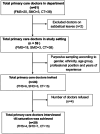Exploring primary care doctors' perceptions and experiences in adopting mHealth with patients: A qualitative study
- PMID: 40463988
- PMCID: PMC12130653
- DOI: 10.1177/20552076251347850
Exploring primary care doctors' perceptions and experiences in adopting mHealth with patients: A qualitative study
Abstract
Objective: While there is a rise in mobile health (mHealth) usage and evidence of improved patient care, its widespread acceptance and adoption are limited. User engagement is a major determinant in successful implementation of mHealth. However, there is limited understanding of doctors' challenges in adopting mHealth in their clinical practice. This study explored the perception and experiences of primary care doctors (PCDs) in adopting mHealth with their patients.
Methods: A qualitative study was conducted using semi-structured interviews with 20 primary care doctors (4 family medicine specialists, 15 family medicine trainees, and 1 medical officer) in Malaysia. PCDs were purposively sampled based on gender, ethnicity, age groups, professional position and years of experience. All interviews were audio-recorded and transcribed verbatim. The qualitative analysis was performed using a thematic analysis.
Results: Five themes emerged from this study: (1) perceived benefits of adopting mHealth with patients, (2) doctors' approaches to facilitating mHealth use and adoption, (3) identifying credible mHealth resources, (4) selecting patients to adopt mHealth, (5) privacy concerns when delivering mHealth.
Conclusion: Despite positive perception of mHealth use in improving patient care, PCDs face significant challenges in adopting mHealth with patients. To address these barriers, targeted interventions should be developed to enhance PCDs' knowledge, skills, and confidence in integrating mHealth in their clinical practice. We need to find ways to provide support for PCDs in mHealth adoption, particularly in resource-limited settings.
Keywords: adoption; doctors; mHealth; primary care; qualitative.
© The Author(s) 2025.
Conflict of interest statement
The authors declared no potential conflicts of interest with respect to the research, authorship, and/or publication of this article.
Figures
Similar articles
-
Why is there variation in the practice of evidence-based medicine in primary care? A qualitative study.BMJ Open. 2016 Mar 9;6(3):e010565. doi: 10.1136/bmjopen-2015-010565. BMJ Open. 2016. PMID: 26962037 Free PMC article.
-
Examining Healthcare Practitioners' Perceptions of Virtual Physicians, mHealth Applications, and Barriers to Adoption: Insights for Improving Patient Care and Digital Health Integration.Int J Gen Med. 2025 Apr 1;18:1865-1885. doi: 10.2147/IJGM.S515448. eCollection 2025. Int J Gen Med. 2025. PMID: 40191233 Free PMC article.
-
Benefits and Barriers to mHealth in Hypertension Care: Qualitative Study With German Health Care Professionals.JMIR Hum Factors. 2025 Mar 10;12:e52544. doi: 10.2196/52544. JMIR Hum Factors. 2025. PMID: 40063928 Free PMC article.
-
Perceptions of Health Care Providers Regarding a Mobile Health Intervention to Manage Chronic Obstructive Pulmonary Disease: Qualitative Study.JMIR Mhealth Uhealth. 2019 Jun 10;7(6):e13950. doi: 10.2196/13950. JMIR Mhealth Uhealth. 2019. PMID: 31199330 Free PMC article.
-
Health workers' perceptions and experiences of using mHealth technologies to deliver primary healthcare services: a qualitative evidence synthesis.Cochrane Database Syst Rev. 2020 Mar 26;3(3):CD011942. doi: 10.1002/14651858.CD011942.pub2. Cochrane Database Syst Rev. 2020. PMID: 32216074 Free PMC article.
References
-
- World Health Organization . M-Health: new horizons for health through mobile technologies. In: Global observatory for eHealth Series, vol. 3. Geneva: World Health Organization, 2011, pp.6.
LinkOut - more resources
Full Text Sources



